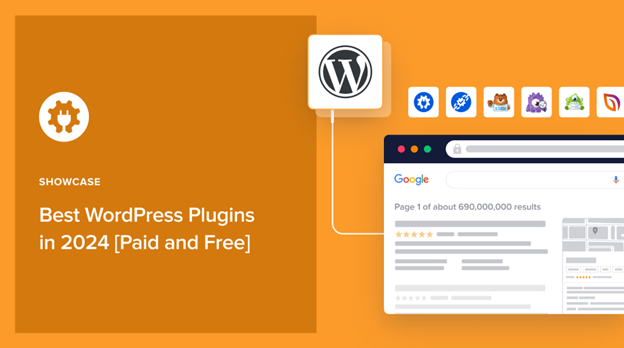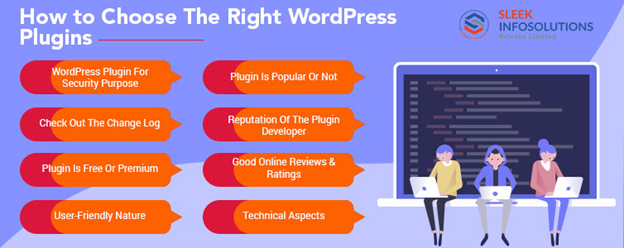Content
SHARE

WordPress is one of the most popular content management systems (CMS) in the world, and its popularity continues to grow each year. One of the reasons for its success is the availability of plugins, which enhance the functionality of WordPress websites. In this article, we will explore the importance of WordPress plugins and guide you in choosing the best ones for your website in 2025.
Understanding the Importance of WordPress Plugins
WordPress plugins are like virtual assistants for your website. They add extra features and capabilities that aren’t built into the WordPress core. Whether you want to improve your website’s performance, enhance its security, or integrate with social media platforms, there’s a plugin out there to help you achieve your goals.
Plugins offer a wide range of benefits that can greatly enhance your WordPress experience. They provide you with the tools to customise your website’s design, making it visually appealing and unique. With the ability to choose from thousands of plugins, you can add functionality that suits your specific needs and requirements.
One of the key advantages of using plugins is the ability to improve your website’s search engine optimisation (SEO). SEO plays a crucial role in driving organic traffic to your site, and plugins can help you optimise your content, meta tags, and URLs to increase your chances of ranking higher in search engine results.
Furthermore, plugins can enhance the user experience of your website. They allow you to add interactive elements, such as sliders, galleries, and contact forms, making it easier for visitors to navigate and engage with your content. By providing a seamless and user-friendly experience, plugins can help you attract and retain more visitors, ultimately leading to increased conversions and success.
How Plugins Enhance Your WordPress Experience
Plugins have the transformative ability to elevate your website from a basic online presence to a dynamic platform. They empower you to personalise your site’s design, optimise search engine performance, and enrich user experience. With plugins, you can build a website that mirrors your brand and fulfils your specific requirements. Consider a scenario where you operate a photography website and aspire to present your portfolio in an elegant and visually striking manner. Utilising a plugin tailored for crafting beautiful image galleries, you can effortlessly curate a captivating showcase of your work. These plugins often provide a range of customisation options, enabling you to select layouts, transition effects, and other visual elements that seamlessly align with your distinctive photography style.
Another example is if you run an e-commerce website and want to offer a seamless shopping experience to your customers. With the help of plugins, you can integrate a secure payment gateway, set up a user-friendly shopping cart, and even enable features like product recommendations and customer reviews. These plugins not only enhance the functionality of your website but also instil trust and confidence in your customers, leading to increased sales and customer satisfaction.
Key Features To Look For in A Plugin
When choosing a plugin, it’s important to consider its key features. Look for plugins that are regularly updated, have good user ratings and reviews, and are compatible with your WordPress version. Additionally, consider whether the plugin offers reliable support, as prompt assistance can be crucial if you encounter any issues with its functionality. Regular updates are essential to ensure that the plugin remains compatible with the latest version of WordPress and that any security vulnerabilities are promptly addressed. User ratings and reviews can provide valuable insights into the plugin’s performance and reliability. It’s always a good idaa to read through the reviews to see if other users have encountered any major issues or if they have found the plugin to be beneficial for their website.
Compatibility with your WordPress version is crucial to ensure that the plugin functions properly and doesn’t cause any conflicts with other plugins or themes. Before installing a plugin, check the compatibility information provided by the developer. If the plugin is not compatible with your version of WordPress, it’s best to look for an alternative that meets your requirements. Lastly, reliable support is important in case you encounter any technical difficulties or have questions about the plugin’s functionality. Look for plugins that offer documentation, tutorials, and a responsive support team that can assist you in a timely manner. Having access to reliable support can save you a lot of time and frustration, ensuring that your website remains functional and optimised.

Top-Rated WordPress Plugins For 2025
In 2025, several plugins stand out for their exceptional performance and popularity among WordPress users. Let’s explore some of the top-rated plugins in different categories:
Essential Plugins For Website Optimisation
Optimising your website’s performance is crucial for providing a seamless user experience. Plugins like W3 Total Cache and WP Smush can help optimise your site’s loading speed by caching and compressing files. These plugins can significantly improve your website’s performance and reduce bounce rates.
Must-Have Plugins For Security
Ensuring the security of your website is of utmost importance in 2025. Plugins such as Wordfence Security and Sucuri Security provide robust protection against hacking attempts, malware, and other security threats. By implementing these plugins, you can protect your website and keep your visitors’ data secure.
Best Plugins For Social Media Integration
Social media integration is essential for promoting your website and engaging with your audience. Plugins like Floating Social Share Icons and Smash Balloon Social Photo Feed allow you to add social media sharing buttons and display your social media feeds on your website. These plugins make it easy for visitors to share your content and connect with you on social platforms.

How To Choose the Right WordPress Plugin
With thousands of plugins available, choosing the right ones can be overwhelming. Here are some tips to help you make the best decisions:
Assessing Your Website’s Needs
Before jumping into the world of plugins, take a step back and evaluate your website’s needs. Identify the specific features and functionalities you want to add or improve. This will help you narrow down your choices and select plugins that align with your goals.
Evaluating Plugin Reviews and Ratings
When researching plugins, pay attention to user reviews and ratings. Reading about other users’ experiences can give you valuable insights into the plugin’s reliability and effectiveness. Look for plugins with high ratings and positive reviews, as they are more likely to meet your expectations.
Considering the Plugin’s Compatibility and Support
Compatibility and support are crucial factors to consider when choosing a plugin. Ensure that the plugin is compatible with your WordPress version and other plugins you’re using. Additionally, check if the plugin developer provides timely support in case you need assistance or encounter any issues with the plugin.
Installing and Managing Your WordPress Plugins
Once you have chosen your desired plugins, it’s time to install and manage them effectively. Here’s a step-by-step guide:
Step-By-Step Guide To Plugin Installation
- Log in to your WordPress dashboard.
- Navigate to the “Plugins” section in the sidebar.
- Click on “Add New” to search for the plugin you want to install.
- Once you’ve found the plugin, click on “Install Now.”
- After installation, click on “Activate” to enable the plugin’s functionality.
- Configure the plugin’s settings according to your preferences.
Tips for Managing Your Plugins Effectively
- Regularly update your plugins to ensure compatibility and security.
- Deactivate and delete any plugins that you no longer use.
- Keep your number of active plugins to a minimum to maintain optimal website performance.
- Regularly backup your website to safeguard against potential plugin conflicts or failures.
Keeping Your WordPress Plugins Updated
Regularly updating your plugins is essential for maintaining a secure and functional website. Here’s why it’s important:
The Importance of Regular Plugin Updates
Plugin updates often include bug fixes, performance improvements, and security patches. By keeping your plugins up to date, you can ensure that your website remains secure, runs smoothly, and benefits from the latest features and enhancements.
How To Update Your Plugins Safely
To update your plugins safely, follow these steps:
- Backup your website files and database.
- Log in to your WordPress dashboard.
- Navigate to the “Plugins” section.
- Check for available updates Under the “Installed Plugins” tab.
- Click “Update Now” for each plugin or use the “Update All” button if available.
- After updating, test your website’s functionality to ensure everything works correctly.
Regularly updating your plugins can maximise your website’s security, performance, and functionality. Choosing the right WordPress plugins is essential for taking your website to the next level in 2025. Whether it’s optimising your website’s performance, enhancing its security, or integrating with social media platforms, plugins are available to meet your needs. Remember to evaluate your website’s requirements, read reviews and ratings, and prioritise compatibility and support when making decisions. With the right plugins installed and managed effectively, you can create a powerful and engaging WordPress website that keeps visitors returning for more.
[thrive_leads id=’3540′]
Frequently Asked Questions About WordPress Plugins
What Are WordPress Plugins?
A WordPress plugin is a piece of software that “plugs into” your WordPress site. Plugins can add new functionality or extend existing functionality on your site, allowing you to create virtually any kind of website, from ecommerce stores to portfolios to directory sites.
Is WordPress Plugins Free?
The largest source of plugins that are free and open source, like WordPress itself, is the official WordPress Plugin Directory. This directory is immediately available with any WordPress install so that users can browse its contents directly from the site’s admin dashboard.
What Can Plugins Do?
Computer software that adds new functions to a host programme without altering the host programme itself. Widely used in digital audio, video, and Web browsing, plug-ins enable programmers to update a host programme while keeping the user within the programme’s environment.
Why Do We Use Pluginsplugin in WordPress?
Plugins are the building blocks of your WordPress site. They bring in important functions to your website, whether you need to add contact forms, improve SEO, increase site speed, create an online store, or offer email opt-ins. Whatever you need your website to do can be done with a plugin.











